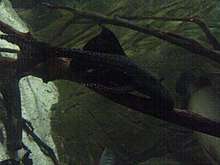Acanthicus adonis
Acanthicus adonis, the adonis pleco or polka dot lyre-tail pleco, is a large species of armored catfish.[1][2] It was originally described from the lower Tocantins River in Brazil, but individuals resembling the species have also been recorded from Amazonian Peru.[3][4] The species is occasionally seen in the aquarium trade, but its massive adult size and territorially aggressive behavior means that a very large tank is required.[4][1] These fish are opportunistic omnivores.[1]
| Acanthicus adonis | |
|---|---|
 | |
| Scientific classification | |
| Kingdom: | Animalia |
| Phylum: | Chordata |
| Class: | Actinopterygii |
| Order: | Siluriformes |
| Family: | Loricariidae |
| Genus: | Acanthicus |
| Species: | A. adonis |
| Binomial name | |
| Acanthicus adonis | |
Appearance
Acanthicus adonis is among the largest armored catfish species and reaches a length of 1 m (3.3 ft).[1][4]
It is dark brown to black with numerous white spots as a juvenile. As the fish matures, the spots become less numerous and smaller, often disappearing entirely in large adults.[1][4] Its close relative A. hystrix always lack white spots, regardless of age.[3][5] In contrast, A. adonis lacks the vermiculated pattern often (but not always) found on the underparts of A. hystrix.[3][5]
References
- PlanetCatfish: Acanthicus adonis. Retrieved 17 May 2013
- Froese, Rainer and Pauly, Daniel, eds. (2011). "Acanthicus adonis" in FishBase. December 2011 version.
- Chamon, C.C. (2016): Redescription of Acanthicus hystrix Agassiz, 1829 (Siluriformes: Loricariidae), with comments on the systematics and distribution of the genus. Zootaxa, 4088 (3): 395–408.
- "Acanthicus adonis". SeriouslyFish. Retrieved 31 October 2017.
- Chamon, C.C. (2011). "Revisão taxonômica e relações filogenéticas do grupo Acanthicus (Siluriformes, Loricariidae)" (PDF). São Paulo State University. doi:10.11606/T.41.2012.tde-13072012-101458.
| Wikimedia Commons has media related to Acanthicus adonis. |